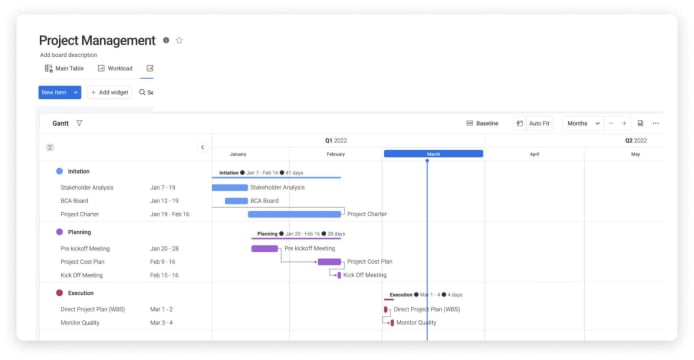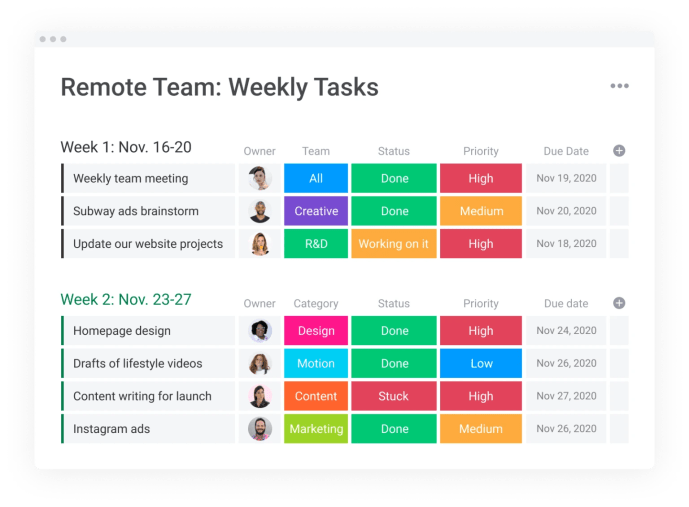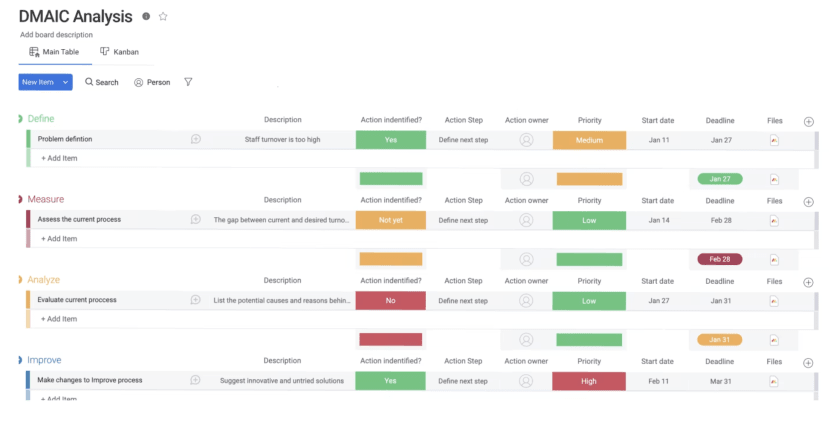The word ‘efficiency’ is a common term mentioned at meetings or performance reviews, but knowing what it means exactly and how to achieve it is more unusual.
Efficiency measures the amount of output for each unit of input, such as capital, time, daily tasks, and so on. And there are many possible outputs — profits, sales, new website, social media campaign, product launches, customer engagement, and more.
Businesses that do more with fewer resources have up to 50% higher operating margins than their less productive counterparts. Therefore, uncovering ways to increase efficiency is a great way to increase productivity and reduce waste.
Almost every team member could be more efficient with the right software and resources. In this blog, you’ll come away with some efficiency best practices and learn how to accomplish more with templates that improve work, promote collaboration, and maximize resources such as time.
The various benefits of increased efficiency
Increased efficiency is all about getting more out of every unit of completed work, but there are other advantages as well, including:
Less waste: Improving efficiency and streamlining tasks helps throughput, boosts productivity margins, and decreases the carbon footprint for your office, industrial process, and environmental reports.
Using a process that requires the same form for different departments? Save effort and eliminate a paper trail by keeping the information in a single central location, such as a cloud-based curated template.
Improved morale: Inefficient or tedious processes can make employees feel frustrated or less dedicated regarding their role.
Implementing a process that reduces waste and increases each person’s productivity can improve morale and result in stronger engagement, and improved retention.
Tip: provide the space for your employees to make suggestions about how to improve a process and then brainstorm how you can implement their suggestions. They’ll feel heard, which can raise engagement, and you could improve efficiency and increase your impact for the company.
Higher profits: Switching to a template-based process saves time. Instead of having to manually fill in the steps for each new process or come up with the structure, you’ll already have the bones of a successful plan. Save different processes as a template so that when when one process needs to resemble another, you can spend less time planning and just jump right in.
Improved regulatory compliance: Adopting a central workflow model increases efficiency and ensures filings and compliance measures stay transparent and manageable. This is especially important for government-regulated businesses. Templates help ensure teams always include important details and follow protocols.

The benefits of increasing efficiency stretch from a team level to the company level. Though not all strategies will work for every team, there are some tricks you can use to get the most out of your resources.
What are some best practices for increasing business efficiency?
There are general guidelines to increasing efficiency — practices that can work together or stand independently, partially implement or have the entire organization adopt. No matter your approach, they can make a difference for your workflow.
Let’s explore a few best practices:
1. Automate processes
Any time you can automate a task or workflow, you can save time and reduce human error.
Automations help ensure tasks get completed faster than if done manually.
Let’s say a customer service process requires a frontline operator to triage incoming calls and refer them to the correct department. An automated directory that lets callers choose the correct department would save time and be able to handle more calls.
2. Encourage communication
Creating a work environment that facilitates rapid communication between team members—even those working remotely—is essential.
Spending a few minutes each day clarifying instructions, multiplied by dozens or hundreds of employees can be a huge time saver.Creating a shared, virtual environment for work-from-home employees that makes it easy to collaborate and keep everyone accountable can improve time management.
3. Reduce distractions; Promote single-tasking
Distractions come in many forms from technology to multitasking.
Although it might feel more productive to do multiple things at once, multitasking may lessen task completion. When the phone keeps ringing or you answer every email within minutes of getting it, productivity inevitably suffers.
Utilize a work software that allows you and your team to set task priorities, track progress, and understand how much each task takes with a built in time-tracking tool.
4. Implement task management software and standardized templates
Task management software has a wide range of benefits, among those is increasing efficiency for teams and larger organization.
A single, central hub—such as a Work OS—encourages a clear flow of ideas and actions that cut down on miscommunications and production snags.
With a Work OS, teams can make changes to the template from a central location, encouraging knowledgeable supervisors and team leads to implement improvements with a simple update, task creation, or automation.
You can use the above tips to improve productivity and innovation, but without a team or company that’s willing to adapt to quickly changing needs, you won’t get as much done in shorter timeframes. This is why many companies adopted the agile approach to make they can implement changes fast.

How do agile organizations increase efficiency?
One trademark of successful organizations is that they’re often willing to make continuous improvements to workflows, build feedback into processes, and stay open to suggestions for improvement.
If you can find a solution that supports these goals, your organization is on track to a more efficient process.
The monday.com DMAIC template for example is ideal for project managers looking to continuously track improvements. In this structured, five-step process improvement plan, product and project managers can skip the document setup phase and get right into improving processes.

Aside from the DMAIC template, monday.com has several features and tools that can help any team achieve more with less. Let’s take a look at what those are.
Three ways monday.com helps teams boost efficiency
Using powerful cloud services and advanced work management tools, monday.com Work OS helps users build efficient processes for everything from sales and social media engagement to order fulfillment and customer service.
Our Work OS offers several benefits to boost efficiency right away, including:
- Centralizing work processes, tools, and essential files: Through a centralized, cloud-hosting approach, monday.com puts all the tools your team needs—such as zoom, automations, tagging features, and more— in a single spot for easy access and use. With our Time Study Template, you can handle several aspects of the retail process at once. Track your time, process orders, resolve customer complaints, and communicate changes to everyone involved on a Work OS template.
- Better and more efficient cross and inter-department communication: Break down barriers that lead to miscommunication and lost opportunities by bridging silos with a single point of reference. The monday.com Work OS creates a central point to flexibly form and rearrange teams, tag and assign team members to tasks, write updates to keep relevant parties informed, set deadlines, and plenty more. This, in turn, boosts efficiency, employee participation, and idea sharing.
- A more standard process and format: A Work OS that all employees can easily use simplifies almost every other part of a business. For example, the monday.com Recruitment and Onboarding Template ensures new employees can onboard more efficiently by immediately giving them access to relevant resources, allowing them to ask questions in context of the work or resource, and know who to contact for assignments.
![]()
If you’d like to learn more about increasing efficiency, scroll down to our FAQ.
FAQs
What do we mean by efficiency?
Efficiency is the relationship between inputs and outputs — getting the highest outputs for every input invested.
What increases efficiency in the workplace?
Efficiency increases with faster processes, fewer steps to each process, and as much automation as possible. Curated templates can help by creating a unified process for every task, all on a single Work OS.
Whether your organization is working on sales, customer service, company culture, or other various outputs, curated templates help improve efficiency through automated setup, communication and team management.
Create fool and future-proof processes on monday.com
Improving work, promoting collaboration, and maximizing resources are all solid goals, but it’s often hard to know exactly how to achieve them. On monday.com Work OS, teams have all the tools they need to quickly implement new processes, communicate team, department, or organization-wide to keep everyone aligned, track progress, and manage any kind of work. Increase efficiency in just a few clicks with a platform trusted by 152K+ teams.

